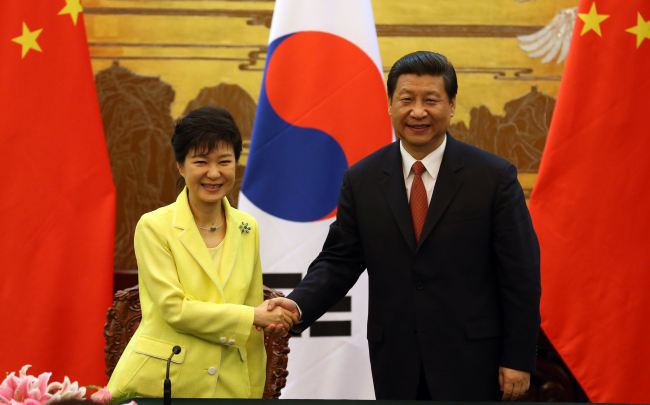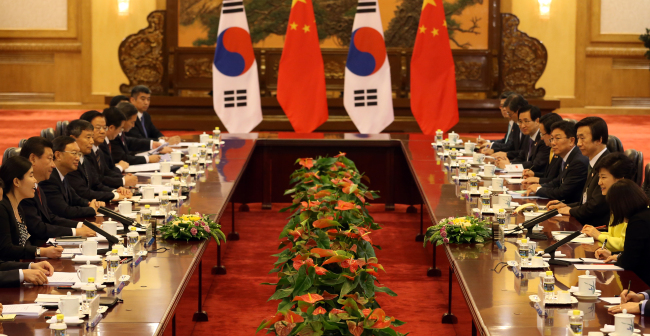Park, Xi vow closer cooperation on N. Korea denuclearization
Leaders agree on stronger strategic partnership on security, region, economy
By Korea HeraldPublished : June 27, 2013 - 22:41
President Park Geun-hye and Chinese leader Xi Jinping on Thursday affirmed intolerance toward North Korea’s nuclear programs and vowed to closely cooperate for denuclearization of the Korean Peninsula.
The two leaders also agreed to bolster bilateral ties with diverse security dialogue including a high-level communication channel, and speed up free-trade negotiations and mutually beneficial economic exchanges, in a joint communiqu released after their first summit talks.
Park arrived in Beijing in the afternoon for her four-day state visit.
“Both sides shared the view that North Korea’s possession of nuclear weapons is unacceptable under any circumstance and agreed that we will continue to strategically cooperate to realize North Korea’s denuclearization and maintain peace and stability of the Korean Peninsula, which affirms our shared national interests,” Park said in a joint press conference.
For this, the two presidents agreed that international obligations and agreements including the U.N. resolutions and Sept. 19 Joint Statement must be faithfully implemented, she said.
“It is hoped that we can work together to build the foundation for a peaceful unification of the Korean Peninsula.”
Winning support from Beijing for denuclearizing the North is one of the key purposes of Park’s trip.
Xi welcomed Park’s trust-building process for the two Koreas, while Park urged China to provide a constructive contribution for new change on the Korean Peninsula.
Xi said signs of change in the prolonged tension on the Korean Peninsula were being detected and that it is hoped the six-party talks can resume in the near future.
China, which has long prioritized stability in the North as its largest economic backer, has taken sterner actions against Pyongyang since it defiantly carried out a nuclear test in February raised concerns of a potential regional arms race.
The two leaders also agreed to bolster bilateral ties with diverse security dialogue including a high-level communication channel, and speed up free-trade negotiations and mutually beneficial economic exchanges, in a joint communiqu released after their first summit talks.
Park arrived in Beijing in the afternoon for her four-day state visit.
“Both sides shared the view that North Korea’s possession of nuclear weapons is unacceptable under any circumstance and agreed that we will continue to strategically cooperate to realize North Korea’s denuclearization and maintain peace and stability of the Korean Peninsula, which affirms our shared national interests,” Park said in a joint press conference.
For this, the two presidents agreed that international obligations and agreements including the U.N. resolutions and Sept. 19 Joint Statement must be faithfully implemented, she said.
“It is hoped that we can work together to build the foundation for a peaceful unification of the Korean Peninsula.”
Winning support from Beijing for denuclearizing the North is one of the key purposes of Park’s trip.
Xi welcomed Park’s trust-building process for the two Koreas, while Park urged China to provide a constructive contribution for new change on the Korean Peninsula.
Xi said signs of change in the prolonged tension on the Korean Peninsula were being detected and that it is hoped the six-party talks can resume in the near future.
China, which has long prioritized stability in the North as its largest economic backer, has taken sterner actions against Pyongyang since it defiantly carried out a nuclear test in February raised concerns of a potential regional arms race.

China has backed U.N. sanctions and joined separate U.S. sanctions by suspending all transactions with the North’s Foreign Trade Bank.
Park and Xi agreed that it was important for the two Koreas as direct parties to actively engage in efforts to solve problems of the Korean Peninsula such as through dialogue.
They also shared a common understanding of Park’s Seoul initiative vision aimed at building trust in Northeast Asia to eliminate confrontations and distrust embedded between countries in the region.
In their statement, Park and Xi highlighted four principles in Sino-South Korean relations: better mutual understanding and trust; stronger future-oriented mutual cooperation; egalitarian principles and respect for international regulations; and contribution to the regional and international communities’ peace, stability and prosperity.

Based on such principles, Park and Xi agreed on three major tasks to accomplish within the next five years: to fortify strategic communication in politics and security, to expand cooperation in economic and social fields, and to promote diverse exchanges in liberal arts.
For this, the two sides will engage in continuous summit-level communication through visits, letters, special envoys and telephone calls. Korea’s chief of national security Kim Jang-soo and China’s state councilor for foreign affairs Yang Jiechi will establish high-level dialogue channel. A hotline will be set up, while strategic dialogues between vice foreign ministers will be held twice a year. Such political and security communication will also take place between political parties and state-run research institutes.
Both leaders agreed to speed up the free trade agreement negotiation that will be of mutual benefit to both sides and to realize $300 billion in trade by 2015.
Seoul and Beijing launched official FTA negotiations in May last year and so far have held five rounds of talks. The next round is scheduled for early July.
After the summit talks, Park and Xi oversaw the signing of seven agreements including on diplomatic visa exemption, trade, marine science technology, energy conservation and R&D on application technology.
The two wrapped up the first day’s schedule with a dinner hosted by Xi at the Great Hall of the People, joined by 140 Korean and Chinese participants.
On Friday, Park will meet with China’s Premier Li Keqiang and Zhang Dejiang, chairman of the Standing Committee of the National People’s Congress, to discuss ways to strengthen bilateral relations.
She will also address a forum of business leaders from the two countries and deliver a speech, reportedly in Chinese, at a university in Beijing. Park is also set to visit South Korean firms operating in China before flying to the western city of Xian on Saturday.
Xian, an ancient capital with more than 3,000 years of history, is a base for China’s push to develop the western part of the country and is well known as the political origin of Xi. Cheong Wa Dae said Park’s visit, which will be the first by a South Korean president, reflects the great potential as a foothold for South Korean firms trying to expand to Central Asia and Europe.
Park plans to meet with leaders of the Shaanxi province for wider economic cooperation. She will also visit South Korean companies and cultural sites there, Cheong Wa Dae said.
A record 71 business leaders are accompanying Park on her China trip.
By Lee Joo-hee (jhl@heraldcorp.com)
-
Articles by Korea Herald








![[Graphic News] More Koreans say they plan long-distance trips this year](http://res.heraldm.com/phpwas/restmb_idxmake.php?idx=644&simg=/content/image/2024/04/17/20240417050828_0.gif&u=)
![[KH Explains] Hyundai's full hybrid edge to pay off amid slow transition to pure EVs](http://res.heraldm.com/phpwas/restmb_idxmake.php?idx=644&simg=/content/image/2024/04/18/20240418050645_0.jpg&u=20240419100350)






![[From the Scene] Monks, Buddhists hail return of remains of Buddhas](http://res.heraldm.com/phpwas/restmb_idxmake.php?idx=652&simg=/content/image/2024/04/19/20240419050617_0.jpg&u=20240419175937)

![[KH Explains] Hyundai's full hybrid edge to pay off amid slow transition to pure EVs](http://res.heraldm.com/phpwas/restmb_idxmake.php?idx=652&simg=/content/image/2024/04/18/20240418050645_0.jpg&u=20240419100350)

![[Today’s K-pop] Illit drops debut single remix](http://res.heraldm.com/phpwas/restmb_idxmake.php?idx=642&simg=/content/image/2024/04/19/20240419050612_0.jpg&u=)